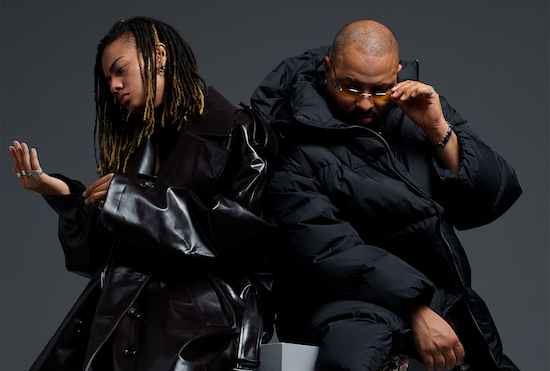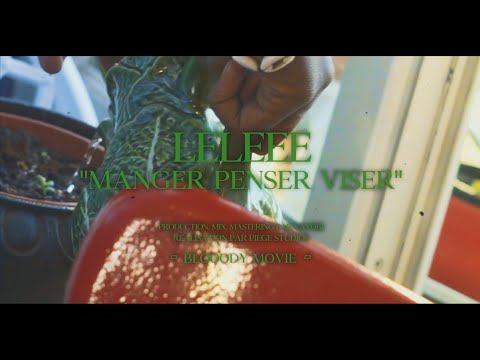Lala &ce and Low Jack
In August I spoke to dancer, hacker and producer NSDOS about the fact that a number of beatmakers in the French rap scene are essentially making excellent, and sometimes pretty avant-garde electronic music, while hyperpop, 2-step and, this year, the Jersey club sound have been absorbed and hybridised with trap/cloud rap and drill. “But,” he said, “it’s still disconnected from the club scene, so you won’t see [rap artists] playing at a techno event whereas it should be possible.”
So there was no way that an album on PAN by Lala &ce – a rising star of the French rap scene, whose frequently vaporous style places her in the ‘cloud rap’ bracket – and producer and Editions Gravats label boss Philippe Hallais (aka Low Jack) wasn’t going to resonate with me. With other young figures from the rap scene present on the album, and even a contribution from Félicia Atikinson, here was French rap explicitly dialoguing with contemporary electronic music.
In choosing my ‘best’ French releases of the year, I can’t help being led by my current passions and lines of inquiry. But when I think about Emmanuelle Parrenin, or Eliane Radigue, there in my ten favourite releases of 2022 as well, I also think about artists for whom it’s taken a long time to get their due. And both are still producing essential work which should be recognised now, not left to be (re)discovered by a later generation. While the increased interest in French music released in the 70s, for example, is heartening (and there are people engaged in very valuable work on this front), it’s important to recognise what’s happening right now, under our noses.
The same goes for the other acts in this list. On the one hand, this is a catalogue of my current obsessions, like French rap and avant-garde folk – obsessions that will doubtless evolve. On the other, by including a release in this list, I’m also betting on the fact that it will still sound vital in years to come. Let’s celebrate the future classics now, while those responsible are still around to receive the acclaim. Here they are:
Lala&ce, Low Jack – Baiser Mortel
(PAN)
The union of producer Philippe Hallais aka Low Jack and Franco-Ivorian rapper Lala &ce makes explicit the sonic affinity between French rap and left-field electronics. The soundtrack to a theatrical production of the same name – inspired by Mitchell Liesen’s 1934 film Death Takes A Holiday – and with a cast that also includes several other fresh faces from the Gallic rap scene (BabySolo33, Jäde, Rad Cartier and Le Diouck) as well as producers Myd, Sam Tiba and even Félicia Atikinson, it’s also a beautifully structured, flowing work that fuses shimmering cloud rap with sculpted dub and dancehall rhythms.
Omertà – Collection Particulière
(Standard in-Fi/Zamzamrec)
Part of the Standard In-Fi/France/La Nóvia extended family, Omertà have traded in the small-hours murk of their debut for a chunky backbeat, mesmerising, acid-tinged grooves and a greater urgency in Florence Giroud’s sung-spoken delivery. ‘Moments In Love’, which even has a chorus of sorts, is their loveliest song to date and Collection Particulière is perfectly formed.
Emmanuelle Parrenin – Targala, La Maison Qui N’En Est Pas Une
(Johnkôôl Records)
The months since its release have not altered my opinion that the concluding album in Parrenin’s ‘Maison’ trilogy is the equal of her 1997 classic Maison Rose. Although less ground-breaking perhaps, its combination of crystalline folk, psychedelia, jazz and electronics is every bit as gorgeous. An album to be experienced now, not ‘rediscovered’ in several decades’ time.
LELEEE – Le Trou De Ver
(Bloody Record)
Operating at the more abstract end of the rap scale and part of a close-knit group of artists that also includes Bleu Nuit and Eryl (who have also both released excellent albums this year), LELEEE distinguished himself with this trippy, time-and-space warping release that is rich in fractured beats, serpentine flows and disorienting samples. His collaboration with beatmaker Avddxct, ., is also essential.
La Colonie Des Vacances – ECHT
(Vicious Circle Records)
Better late than never: after ten years of existence, this riotous four-band pile-up featuring Papier Tigre, Electric Electric, Pneu and Marvin has finally put out a proper debut album. While nothing can match the experience of being assaulted from all sides by La Colonie in a live setting, ECHT is thrilling in its own right, from the controlled chaos of ‘L’Amour Universel’ to the machine-funk of ‘Z.Z.Z’ and the chiming beauty of ‘Spectral’.
Eliane Radigue & Frédéric Blondy – Occam XXV
(Organ Reframed)
My first thought after seeing this piece performed by Blondy earlier this year at Union Chapel was that the organ is such a perfect instrument for Radigue that it’s amazing it took her so long to her round to composing for it. The second thought is that taking a long time to get somewhere is very much what Radigue is about. Transporting and transformative.
Felicia Atkinson – Image Language
(Shelter Press)
It would be easy to take Atkinson’s consistency and the discreet brilliance of her art for granted, but tune into Image Language and once again you find yourself in a unique space, sharing in the flow of another’s thoughts and associations.
Super Parquet – Couteau/Haute Forme
(Airfono Records)
Clearly feeling that their mammoth debut wasn’t quite weighty enough, techo-folk titans Super Parquet returned with an even more monumental double album that pairs the electric jolts of Couteau with Haute Forme’s expansive audio landscapes.
NZE NZE – Adzi Akal
(Teenage Menopause)
Warrior songs of the Fang people of Central Africa, delivered by singer Mathieu Ruben N’Dongo (whose father is from the region), strapped to juddering industrial and motoric-punk beats and slathered in humid echo. What’s not to like?
Léonore Boulanger & Jean-Daniel Botta – Un Lièvre Était Un Très Cher Baiser
(Slouch Hat/Le Saule)
The poems of ‘outsider’ Austrian poet Ernst Herback are a springboard for more dizzying, puzzling but ultimately joyous invention for the trio of Boulanger, Botta and drummer Laurent Séries as they continue to stretch song form to its limits.
The Next Ten
Eve Risser & Red Desert Orchestra – Eurythmia
(Clean Feed)
Société Étrange – Chance
(Bongo Joe/Standard in-Fi)
Arlt – Turnetable
(Objet Disque)
La Féline – Tarbes
(Kwaidan)
Erwan Keravec – Sonneurs 2
(Offshore/Buda Musique)
Jazzy Bazz – Memoria
(3.14 Production)
Heldon – Antelast
(Bam Balam)
Prince Waly – Moussa
(BOY Z)
Quinze Quinze – Vārua
(S76)
Triplego – En Attendant Gibraltar Part 2
(S76)
Finally, I have a bit of space to welcome a few stragglers – excellent recent albums that I haven’t been able to cover before the end of the year; several of these could have made the above list had I spent more time with them.
I’ve mentioned the Standard In-Fi/France/La Nóvia extended family already, and there have been more treats from that direction this year, firstly in the form of the first solo album from La Tène & Tanz Mein Herz member Alexis Degrenier, La Mort Aura Tes Yeux, which beautifully combines reedy drones with stumbling rhythms assembled from bells, marbles, stones, pieces of wood and “vibrating objects.”
Then there’s the La Nóvia’s headspinning Rain Be For Rain Bo, a “mega-mash-up mixtape” that sees two members of the collective, Guilhem Lacroux and Yann Gourdon, pulling together a ‘side’s of outtakes and live recordings each, from various formations including La Baracande, Jéricho and Violineuses, into seamless mixes, the disparate sections forming a single, ecstatic stream, like the memories of different performances and occasions bleeding into each other. Intoxicating.
Producer and percussionist Sébastien Forrester creates his own spectral folk experience by using his collection of 78 recordings featuring the Occitan cabrette and Scottish bagpipes as raw material for the magisterial pieces that make up Orpheus Pipes (Object-Oriented Studies). Forrester adds extra layers of thick distortion and hazy electronics, the sounds of the pipes looming up like wraiths in the mist.
Outer-jazz quartet No Tongues continue to thrill, after their superb Les Voies De L’Oyapock, with Ici. After collaborating with villagers from the Brazil-Guyana border, this time their foils are closer to home. Vocalists include Bégayer’s Loup Alberto, Swedish expats Linda Oláh and Isabel Sörling and Breton Elsa Corre. ‘Parrandanda De Entroido Do Canizo’, featuring Corre, and ‘Fronni D’Alia’ with Loup Alberto bring them into the orbit of France’s avant-folk scene (and in fact the album is co-released by the Pagans label) but there’s so much more going on, from ‘Onze Heure Trente Et Une’s hypnotically buoyant polyrhythms to their interplay on ‘Chien Chien’s with Oláh’s tight-throated squeaks and groans, dog howls and a gurgling baby.
Oiseaux-Tempête, a band currently based around the core trio of Frédéric D. Oberland, Stéphane Pigneul and Paul Régimbeau aka Mondkfopf, are back with What On Earth (Que Diable) one of their most satisfying slabs of widescreen, technofied post-rock. Opener ‘Black Elephant’ is a winningly succinct opener, a dancehall-like rhythm underpinning layers of fuzz and distorted vocals from SUUNS’ Ben Shemie but they really spread their wings on the 20-minute throb of ‘The Crying Eye – I Forget’ (with vocals from Radwan Ghazi Moumneh) and the post-apocalyptic desert caravan vibes of ‘Voodoo Spinning’.
The latest generation of French rap artists features a number of highly distinctive voices but there’s no-one doing it quite like Franco-Moroccan Khali – effects enhance the buzzing, nasal quality of his melodic rapping so that he sounds like a wasp trapped under glass, caught between rage and despondency or, for a brief moment on ‘La Flèche’, like an electric sheep. The trap-based beats on ‘Il Me Ressemble Pas Non Plus’ largely match him for creativity, combining sinuous melodies – guitar, piano and strings – with claps, trickling hi-hats, glitches, penetrating kicks and a willingness to pull the rug out from underneath you mid-track, as on ‘No Psy’ where the beat drops out and it all spirals into a crescendo of bit-crushed synths and rousing chords.
On the reissue front there have been excellent new releases for Richard Pinhas’s synth-heavy classic Iceland, while Souffle Continu have represented the post-68 jazz underground with new editions of albums from François Tusques and Philippe Maté & Jef Gilson, but a newly released favourite comes in the form of the self-titled debut from Cheval De Frise, originally released in 2000 and getting a beautiful deluxe reissue with some quite splendid extra posters/artwork. The duo featured Vincent Beysselance and Thomas Bonvalet – who now records as L’Ocelle Mare – on guitar. While rooted in American post-hardcore, Cheval De Frise feel distinctive at least in part due to Bonvalet’s use of an amplified classical guitar – he switches into distortion but frequently we hear his nimbleness with the clean nylon string sound, the clear strumming and knotty-but-bright arpeggios – but Beysselance matches him for control, fluidity and invention.




